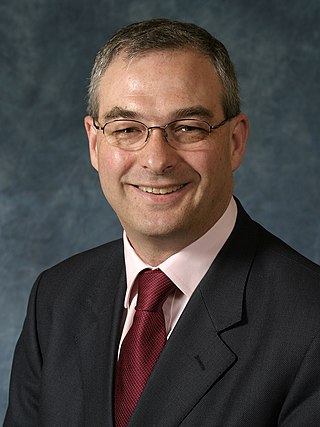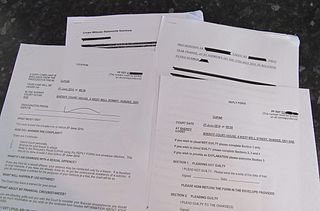Bail is a set of pre-trial restrictions that are imposed on a suspect to ensure that they will not hamper the judicial process. Court bail may be offered to secure the conditional release of a defendant with the promise to appear in court when required. In some countries, especially the United States, bail usually implies a bail bond, a deposit of money or some form of property to the court by the suspect in return for the release from pre-trial detention. If the suspect does not return to court, the bail is forfeited and the suspect may be charged with the crime of failure to appear. If the suspect returns to make all their required appearances, bail is returned after the trial is concluded.
The right to silence is a legal principle which guarantees any individual the right to refuse to answer questions from law enforcement officers or court officials. It is a legal right recognized, explicitly or by convention, in many of the world's legal systems.

The High Court of Justiciary is the supreme criminal court in Scotland. The High Court is both a trial court and a court of appeal. As a trial court, the High Court sits on circuit at Parliament House or in the adjacent former Sheriff Court building in the Old Town in Edinburgh, or in dedicated buildings in Glasgow and Aberdeen. The High Court sometimes sits in various smaller towns in Scotland, where it uses the local sheriff court building. As an appeal court, the High Court sits only in Edinburgh. On one occasion the High Court of Justiciary sat outside Scotland, at Zeist in the Netherlands during the Pan Am Flight 103 bombing trial, as the Scottish Court in the Netherlands. At Zeist the High Court sat both as a trial court, and an appeal court for the initial appeal by Abdelbaset al-Megrahi.

A prosecutor is a legal representative of the prosecution in states with either the adversarial system, which is adopted in common law, or inquisitorial system, which is adopted in civil law. The prosecution is the legal party responsible for presenting the case in a criminal trial against the defendant, an individual accused of breaking the law. Typically, the prosecutor represents the state or the government in the case brought against the accused person.

Discovery, in the law of common law jurisdictions, is a phase of pretrial procedure in a lawsuit in which each party, through the law of civil procedure, can obtain evidence from other parties. This is by means of methods of discovery such as interrogatories, requests for production of documents, requests for admissions and depositions. Discovery can be obtained from nonparties using subpoenas. When a discovery request is objected to, the requesting party may seek the assistance of the court by filing a motion to compel discovery. Conversely, a party or nonparty resisting discovery can seek the assistance of the court by filing a motion for a protective order.

The Crown Office and Procurator Fiscal Service is the independent public prosecution service for Scotland, and is a Ministerial Department of the Scottish Government. The department is headed by His Majesty's Lord Advocate, who under the Scottish legal system is responsible for prosecution, along with the sheriffdom procurators fiscal. In Scotland, virtually all prosecution of criminal offences is undertaken by the Crown. Private prosecutions are extremely rare.

Colin Boyd, Baron Boyd of Duncansby, is a former Scottish judge who was a Senator of the College of Justice from June 2012 to June 2024. He was Lord Advocate for Scotland from 24 February 2000 until his resignation on 4 October 2006. On 11 April 2006, Downing Street announced that Colin Boyd would take a seat as a crossbench life peer; however, he took the Labour whip after resigning as Lord Advocate. He was formally introduced in the House of Lords on 3 July 2006. On the day SNP leader Alex Salmond was elected First Minister of Scotland, it was reported that Boyd was quitting the Scottish Bar to become a part-time consultant with public law solicitors Dundas & Wilson. He told the Glasgow Herald, "This is a first. I don't think a Lord Advocate has ever done this—left the Bar and become a solicitor."

Lady Elish Frances Angiolini is a Scottish lawyer currently serving as Lord Clerk Register, the first woman to hold the role since its creation in the 13th century. Angiolini a Pro Vice Chancellor of the University of Oxford and has served as the Principal of St Hugh's College, Oxford since 2012; she was a candidate in the 2024 University of Oxford Chancellor election.

A procurator fiscal, sometimes called PF or fiscal, is a public prosecutor in Scotland, who has the power to impose fiscal fines. They investigate all sudden and suspicious deaths in Scotland, conduct fatal accident inquiries and handle criminal complaints against the police. They also receive reports from specialist reporting agencies such as His Majesty's Revenue and Customs.

Lawburrows is a little-known civil action in Scots law initiated by one person afraid of another's possible violence. The term is derived from law-borrow, where borrow is used in the archaic sense of a pledge, guarantee, or surety. Hence, it is a "legal security" that a person "will not injure the person, family, or property of another".

Francis Mulholland, Lord Mulholland, is a Scottish judge who has been a Senator of the College of Justice since 2016. He previously served from 2011 to 2016 as Lord Advocate, one of the Great Officers of State of Scotland and the country's chief Law Officer, and as Solicitor General, the junior Law Officer.
An inquest is a judicial inquiry in common law jurisdictions, particularly one held to determine the cause of a person's death. Conducted by a judge, jury, or government official, an inquest may or may not require an autopsy carried out by a coroner or medical examiner. Generally, inquests are conducted only when deaths are sudden or unexplained. An inquest may be called at the behest of a coroner, judge, prosecutor, or, in some jurisdictions, upon a formal request from the public. A coroner's jury may be convened to assist in this type of proceeding. Inquest can also mean such a jury and the result of such an investigation. In general usage, inquest is also used to mean any investigation or inquiry.

The World's End Murders is the colloquial name given to the murder of two girls, Christine Eadie, 17, and Helen Scott, 17, in Edinburgh, in October 1977. The case is so named because both victims were last seen alive leaving The World's End pub in Edinburgh's Old Town. The only person to stand trial accused of the murders, Angus Robertson Sinclair, was acquitted in 2007 in controversial circumstances. Following the amendment of the law of double jeopardy, which would have prevented his retrial, Sinclair was retried in October 2014 and convicted of both murders on 14 November 2014. He was sentenced to life imprisonment with a minimum term of 37 years, the longest sentence by a Scottish court, meaning he would have been 106 years old when he was eligible for a potential release on parole. He died at HM Prison Glenochil aged 73 on 11 March 2019. Coincidentally, he died on the same day the BBC's Crimewatch Roadshow programme profiled the murders.

Scots criminal law relies far more heavily on common law than in England and Wales. Scottish criminal law includes offences against the person of murder, culpable homicide, rape and assault, offences against property such as theft and malicious mischief, and public order offences including mobbing and breach of the peace. Scottish criminal law can also be found in the statutes of the UK Parliament with some areas of criminal law, such as misuse of drugs and traffic offences appearing identical on both sides of the Border. Scottish criminal law can also be found in the statute books of the Scottish Parliament such as the Sexual Offences (Scotland) Act 2009 and Prostitution (Scotland) Act 2007 which only apply to Scotland. In fact, the Scots requirement of corroboration in criminal matters changes the practical prosecution of crimes derived from the same enactment. Corroboration is not required in England or in civil cases in Scotland. Scots law is one of the few legal systems that require corroboration.

A fiscal fine is a form of deferred prosecution agreement in Scotland issued by a procurator fiscal for certain summary offences as an alternative to prosecution. Alternatives to prosecution are called direct measures in Scotland.
The powers of the police in Scotland, as with much of Scots law, are based on mixed elements of statute law and common law.

Trial by jury in Scotland is used in the courts of Scotland in solemn procedure for trial on indictment before a judge and jury for serious criminal cases, and in certain civil cases.
Suzanne Pilley was a 38-year-old British bookkeeper from Edinburgh, Scotland, who went missing on the morning of 4 May 2010. Following a highly publicised appeal for information on her whereabouts and intensive police enquiries, her former lover, David Gilroy, was arrested and charged with her murder. He was found guilty by majority verdict on 15 March 2012 and sentenced to life imprisonment. The judge ordered him to serve a minimum of 18 years in prison. The case is controversial because the prosecution obtained a murder conviction without a body. The body of Suzanne Pilley has never been found.
Criminal procedure in South Africa refers to the adjudication process of that country's criminal law. It forms part of procedural or adjectival law, and describes the means by which its substantive counterpart, South African criminal law, is applied. It has its basis mainly in English law.

The legal system in Scotland grants certain rights to persons accused in criminal proceedings.










